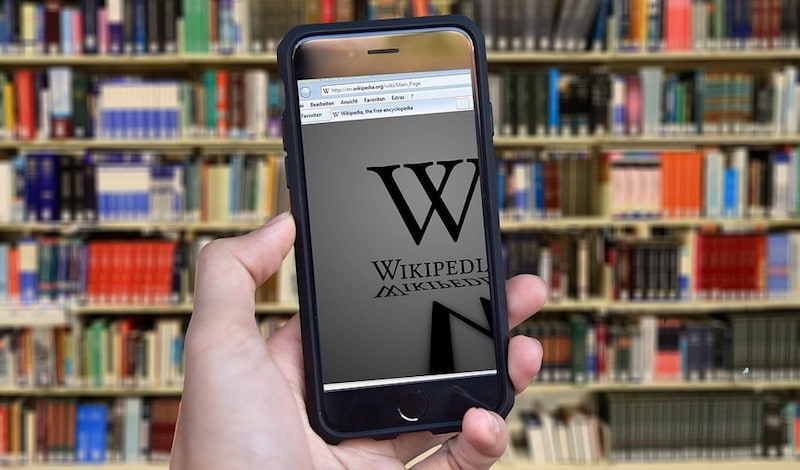- Home
- Internet
- Internet Features
- Why Wikipedia Will Go Offline for 24 Hours in Germany
Why Wikipedia Will Go Offline for 24 Hours in Germany

Online encyclopedia Wikipedia's German edition will go offline for 24 hours next Thursday as its authors try to rally Europeans against a proposed European Union law that would tighten online copyright regulations. Critics fear that the directive could pose risks to freedom of speech in Europe.
If EU lawmakers pass the controversial measure this spring, major content-sharing platforms such as Facebook and Twitter would be liable for their users' copyright violations. To avoid fines, platforms are likely to install so-called upload filters that would check all content for possible violations using automatic software. The technology would be similar to mechanisms already in place on YouTube, where uploaded videos are automatically checked for music copyright violations, and on Facebook, where algorithms detect nude content.
While the proposed EU directive is being backed by a number of artists' associations and publishing companies, its critics fear that "upload filters" would disrupt free discourse online. Political debates on Twitter and Facebook often include the use of memes or GIFs, for instance, which may be deemed copyright infringements under the new rules.
Theoretically, the EU rules would protect the use of copyright-protected footage if it was only quoted, reviewed or caricatured, for example.
But in practice, automatic algorithms are unable to make that call.
"Misplaced confidence in filtering technologies to make nuanced distinctions between copyright violations and legitimate uses of protected material would escalate the risk of error and censorship," said David Kaye, the UN special rapporteur on freedom of expression.
He also argued that the upload filter "appears destined to drive Internet platforms toward monitoring and restriction of user-generated content even at the point of upload. Such sweeping pressure for pre-publication filtering is neither a necessary nor proportionate response to copyright infringement online."
The use of automatic filters would also put a financial strain on smaller platforms, even though the current directive would not affect most start-ups. Wikipedia and other major sites, however, fear that the European Union's copyright initiative might end up making the Internet even more dominated by companies such as Google and Facebook - even though reining in their power has long been a declared goal of EU regulators.
© The Washington Post 2019
Get your daily dose of tech news, reviews, and insights, in under 80 characters on Gadgets 360 Turbo. Connect with fellow tech lovers on our Forum. Follow us on X, Facebook, WhatsApp, Threads and Google News for instant updates. Catch all the action on our YouTube channel.
Related Stories
- Samsung Galaxy Unpacked 2026
- iPhone 17 Pro Max
- ChatGPT
- iOS 26
- Laptop Under 50000
- Smartwatch Under 10000
- Apple Vision Pro
- Oneplus 12
- OnePlus Nord CE 3 Lite 5G
- iPhone 13
- Xiaomi 14 Pro
- Oppo Find N3
- Tecno Spark Go (2023)
- Realme V30
- Best Phones Under 25000
- Samsung Galaxy S24 Series
- Cryptocurrency
- iQoo 12
- Samsung Galaxy S24 Ultra
- Giottus
- Samsung Galaxy Z Flip 5
- Apple 'Scary Fast'
- Housefull 5
- GoPro Hero 12 Black Review
- Invincible Season 2
- JioGlass
- HD Ready TV
- Latest Mobile Phones
- Compare Phones
- Tecno Pova Curve 2 5G
- Lava Yuva Star 3
- Honor X6d
- OPPO K14x 5G
- Samsung Galaxy F70e 5G
- iQOO 15 Ultra
- OPPO A6v 5G
- OPPO A6i+ 5G
- Asus Vivobook 16 (M1605NAQ)
- Asus Vivobook 15 (2026)
- Brave Ark 2-in-1
- Black Shark Gaming Tablet
- boAt Chrome Iris
- HMD Watch P1
- Haier H5E Series
- Acerpure Nitro Z Series 100-inch QLED TV
- Asus ROG Ally
- Nintendo Switch Lite
- Haier 1.6 Ton 5 Star Inverter Split AC (HSU19G-MZAID5BN-INV)
- Haier 1.6 Ton 5 Star Inverter Split AC (HSU19G-MZAIM5BN-INV)







![[Partner Content] OPPO Reno15 Series: AI Portrait Camera, Popout and First Compact Reno](https://www.gadgets360.com/static/mobile/images/spacer.png)









